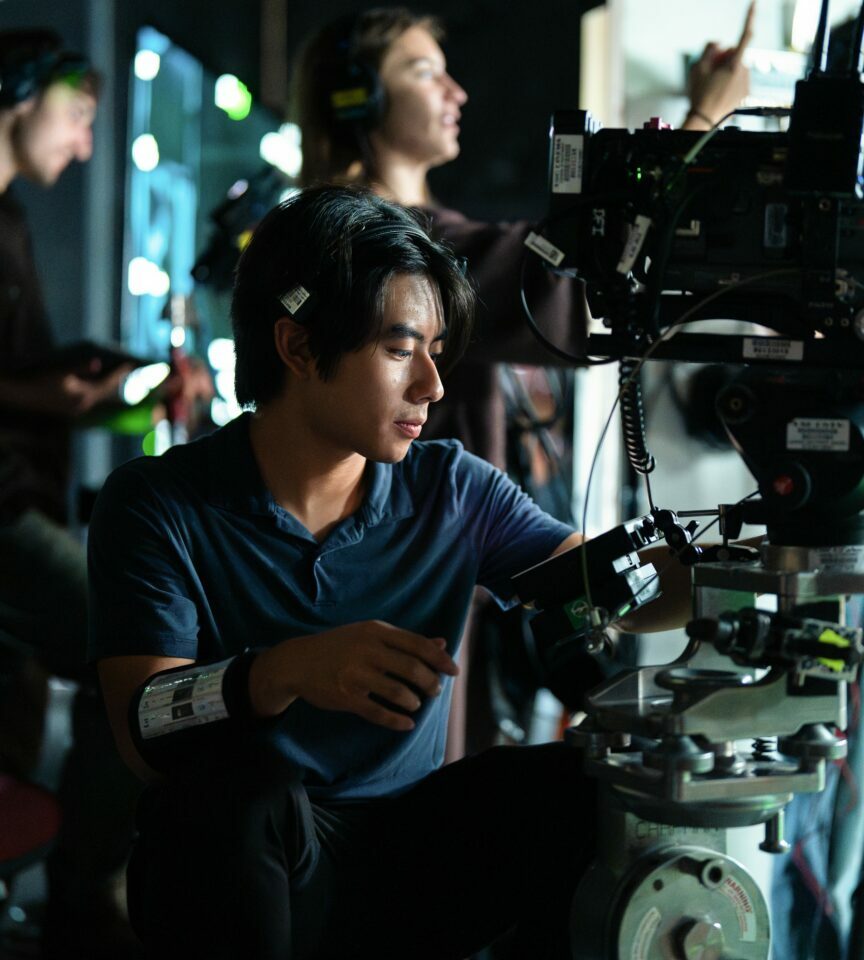Alright – so today we’ve got the honor of introducing you to Shawn Ewashko. We think you’ll enjoy our conversation, we’ve shared it below.
Shawn, so good to have you with us today. We’ve got so much planned, so let’s jump right into it. We live in such a diverse world, and in many ways the world is getting better and more understanding but it’s far from perfect. There are so many times where folks find themselves in rooms or situations where they are the only ones that look like them – that might mean being the only woman of color in the room or the only person who grew up in a certain environment etc. Can you talk to us about how you’ve managed to thrive even in situations where you were the only one in the room?
In situations where I find myself as the only person in the room with a unique appearance, I’ve learned to leverage my individuality as a strength rather than a challenge. First and foremost, I embrace my unique qualities with confidence, recognizing that diversity of thought and background can contribute significantly to the team.
I prioritize professionalism in all interactions, focusing on showcasing my competence and expertise. Building strong relationships with colleagues has been crucial, and I actively engage in networking to connect with individuals from diverse backgrounds. This not only expands my professional circle but also fosters an inclusive environment.
Communication is key in such scenarios. I’ve honed my communication skills to effectively articulate my ideas while actively listening to others. By encouraging open dialogue, I contribute to a more collaborative and understanding atmosphere within the team.
Cultural competence is another aspect I emphasize. I make an effort to learn about different perspectives, fostering a deeper understanding of the diverse dynamics at play. Seeking mentorship from those who have navigated similar situations has been invaluable, providing guidance and insights.
Proactive engagement is essential. I take the initiative to participate in discussions and activities, ensuring that my unique viewpoint is heard. Additionally, I advocate for inclusion within the workplace, supporting initiatives that promote diversity.
Adaptability is a trait I’ve developed, allowing me to navigate different situations with an open mind and flexibility. In the face of challenges or biases, I maintain resilience, staying focused on my goals and determined to succeed.
Continuous learning is a commitment I uphold. Attending workshops and training sessions not only enhances my skills but also demonstrates my dedication to personal and professional development.
In essence, I’ve learned to turn being the only one in the room with a unique appearance into an opportunity to contribute positively, fostering a more inclusive and dynamic work environment.”
Thanks for sharing that. So, before we get any further into our conversation, can you tell our readers a bit about yourself and what you’re working on?
As a VFX Production Manager for Star Trek, my role is pivotal in ensuring the seamless integration of visual effects into the production process, contributing to the overall success and visual appeal of the Star Trek universe. My responsibilities encompass coordinating and overseeing various aspects of visual effects production, from conceptualization to execution.
Key Responsibilities which I directly or indirectly handle:
Project Coordination: I orchestrate the collaboration between different departments, ensuring that the visual effects align with the creative vision of the project.
Budget Management: I assist in the financial aspects of visual effects production, helping to oversee budgets, and allocating resources efficiently to achieve high-quality results within the designated financial parameters.
Timeline Management: I help to create and manage production timelines, ensuring that visual effects are delivered on schedule to meet production deadlines.
Communication: Effective communication is crucial in my role. I liaise with directors, producers, artists, and technical teams, facilitating a smooth flow of information to achieve the desired visual outcomes.
Problem Solving: In the dynamic world of visual effects, challenges are inevitable. I thrive on creatively solving problems and finding innovative solutions to ensure the visual effects align with the project’s creative goals.
What I find most exciting and special about being a VFX Production Manager for Star Trek is the opportunity to contribute to the rich and iconic visual legacy of the franchise. Being part of a team that brings futuristic worlds, advanced technology, and otherworldly phenomena to life is incredibly fulfilling. Every project presents a chance to push the boundaries of visual storytelling, creating awe-inspiring and memorable moments for both long-time fans and new audiences.
In the world of Star Trek, our brand is synonymous with precision, creativity, and a commitment to excellence. We take pride in fostering a collaborative and innovative environment where artists and technicians can push their creative boundaries to deliver groundbreaking visual effects. Our approach is rooted in a balance between artistic vision and technical expertise, ensuring that every visual element enhances the narrative and captivates the audience.
I believe in the power of storytelling through visuals, and our work reflects a passion for creating immersive experiences that transport viewers to new dimensions. As a VFX Production Manager for Star Trek, I am not just managing projects; I am contributing to the legacy of a beloved and enduring franchise, leaving an indelible mark on the future of cinematic storytelling in the Star Trek universe.
There is so much advice out there about all the different skills and qualities folks need to develop in order to succeed in today’s highly competitive environment and often it can feel overwhelming. So, if we had to break it down to just the three that matter most, which three skills or qualities would you focus on?
Reflecting on my journey as a VFX Production Manager for Star Trek, three qualities, skills, or areas of knowledge stand out as the most impactful. Here they are, along with advice for those early in their journey:
Effective Communication:
Impact: The ability to communicate clearly and efficiently has been crucial in coordinating various teams and ensuring a cohesive vision for visual effects.
Advice: Develop strong communication skills, both verbal and written. Practice conveying complex ideas in a straightforward manner. Actively listen to others, seek feedback, and be open to different perspectives. Join industry forums or groups to engage with professionals and enhance your communication skills.
Project Management and Organization:
Impact: Managing budgets, timelines, and resources efficiently is vital in the fast-paced world of VFX production. Strong project management skills contribute to successful and timely project delivery.
Advice: Invest time in learning project management methodologies. Familiarize yourself with industry-standard project management tools and software. Develop a meticulous approach to organization, creating detailed plans and adapting them as needed. Seek mentorship from experienced project managers to gain insights into effective project management strategies.
Adaptability and Problem-Solving:
Impact: The VFX industry is dynamic, with challenges arising frequently. Being adaptable and adept at creative problem-solving has been instrumental in overcoming obstacles.
Advice: Cultivate a mindset of adaptability. Embrace challenges as opportunities to learn and grow. Stay updated on industry trends and technological advancements. Practice critical thinking and encourage a culture of innovation within your team. Don’t be afraid to experiment and find inventive solutions to unique problems.
General Advice for Early Careers:
Continuous Learning: The field of VFX is constantly evolving. Stay curious and commit to continuous learning. Attend workshops, conferences, and training programs to stay updated on industry trends and advancements.
Networking: Build a strong professional network within the industry. Attend industry events, join online forums, and connect with professionals. Networking not only opens up opportunities but also provides valuable insights and mentorship.
Passion and Perseverance: Cultivate a genuine passion for the work you do. The journey in the VFX industry may have challenges, but perseverance and a love for the craft will drive your success.
Seek Feedback: Actively seek feedback on your work. Constructive criticism is a valuable tool for improvement. Embrace a growth mindset, view challenges as learning opportunities, and use feedback to refine your skills.
Team Collaboration: VFX is a collaborative field. Foster a positive and collaborative working environment. Develop interpersonal skills and appreciate the diverse talents within your team.
By focusing on effective communication, project management, adaptability, and embracing continuous learning, early-career professionals can set a strong foundation for success in the dynamic and exciting world of visual effects.
As we end our chat, is there a book you can leave people with that’s been meaningful to you and your development?
The books “The 48 Laws of Power” by Robert Greene and “Extreme Ownership” by Jocko Willink are influential works that have shaped my perspective on power dynamics, leadership, and personal development. Here are a few “nuggets” I keep handy.
From “The 48 Laws of Power” by Robert Greene:
Law 1: Never Outshine the Master:
Valuable Insight: This law emphasizes the importance of subtlety and strategic positioning. It advises against drawing too much attention to oneself, especially in a hierarchical or competitive environment.
Law 3: Conceal Your Intentions:
Valuable Insight: Greene suggests that keeping one’s plans and intentions guarded can provide a strategic advantage. It encourages a level of mystery and unpredictability that can be beneficial in various situations.
Law 15: Crush Your Enemy Totally:
Valuable Insight: This law underscores the idea of decisiveness and thoroughness when dealing with challenges. It suggests that half measures may lead to lingering issues, and it is often more effective to address problems comprehensively.
From “Extreme Ownership” by Jocko Willink:
Extreme Ownership Principle: No Bad Teams, Only Bad Leaders:
Valuable Insight: Willink emphasizes taking full responsibility for outcomes, asserting that effective leadership requires owning both successes and failures. By doing so, one can empower a team to perform at its best.
Decentralized Command:
Valuable Insight: Willink advocates for decentralized decision-making within a team. This principle encourages individuals to take ownership of their areas of expertise, fostering a culture of initiative and responsibility.
Discipline Equals Freedom:
Valuable Insight: Willink’s mantra “Discipline Equals Freedom” underscores the idea that by embracing discipline in one’s actions and decisions, individuals can achieve greater freedom and control over their lives.
Both books offer distinct perspectives—one on the nuances of power dynamics and the other on leadership and ownership. It’s possible that the strategic insights from “The 48 Laws of Power” have influenced my approach to navigating complex situations, while the principles of extreme ownership from Jocko Willink have really shaped my leadership philosophy, emphasizing responsibility and discipline.
Remember that the interpretation and application of these insights may vary, and it’s essential to integrate them into your personal values and context for optimal impact on your development.
Contact Info:
- Website: https://www.imdb.com/name/nm4259209/?ref_=ext_shr_lnk
- Instagram: @vfxshawn
- Linkedin: www.linkedin.com/in/shawnewashko
- Twitter: @shawnvfx








Image Credits
All photo credits go to me. They are my personal photos.




